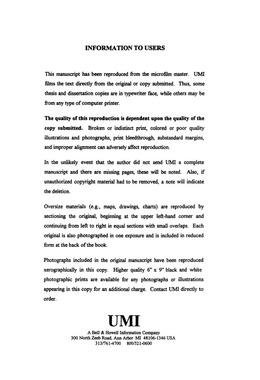| dc.contributor.author | Broyles, Julia Woodward. | en_US |
| dc.date.accessioned | 2013-08-16T12:29:39Z | |
| dc.date.available | 2013-08-16T12:29:39Z | |
| dc.date.issued | 1997 | en_US |
| dc.identifier.uri | https://hdl.handle.net/11244/5486 | |
| dc.description.abstract | The purpose of this study was to examine the effects of videotape analysis on role development of student teachers in music. Topics included: (1) professional role development theory; (2) identification and evolution of student teacher concerns before, during, and after the student teaching experience; (3) perceptions of student teachers involved in self-analysis of their teaching through videotaped feedback; and (4) perceptions of cooperating teachers and university supervisors toward the use of videotape analysis in the supervisory process. | en_US |
| dc.description.abstract | Participants included 12 undergraduate music education students enrolled in student teaching at three universities in central Oklahoma during fall semester 1996. Also involved were 20 public school cooperating teachers, and 8 university supervisors. Utilizing a qualitative methodology, data were gathered from participant questionnaires, observation instruments completed by student teachers while viewing videotaped samples of their teaching, journals kept by student teachers, and questionnaires completed by cooperating teachers and university supervisors. Fuller's three-phase model of teacher concerns and Carper's categories of occupational identity were used to help interpret the relative strength of each participant's professional role development. | en_US |
| dc.description.abstract | Conclusions: (1) role development was evident in all the subjects, as evaluated from the Fuller concerns model. Self-concerns tended to fade and pupil-learning concerns increased during the semester; (2) occupational identity, an important aspect of role development, increased for most subjects as evaluated by the Carper model; (3) viewing videotaped examples of their teaching was found by all the students to be a helpful procedure in their learning to teach; (4) cooperating teachers reported that the videotape analysis seemed to help their student teachers improve in their teaching and become more aware of how well their pupils were learning; (5) university supervisors were highly supportive of the videotaping procedures, reporting that videotape analysis strengthened participants' teacher identity, increased their commitment to refining teaching tasks and skills, and enhanced their concern for pupil learning. Further research was recommended: (1) varying the videotape regimen; (2) utilizing a variety of observation instruments; and (3) examining the use of videotape analysis in pre-student teaching curricular experiences. | en_US |
| dc.description.abstract | The following questions guided the research: (1) What progression through the Fuller teaching concerns is shown by music student teachers? (2) How do student teachers demonstrate a commitment to Carper role development categories? (3) What role development factors can be directly linked to a structured videotape analysis regimen? (4) What are the benefits and problems associated with a structured videotape regimen for student teachers? | en_US |
| dc.format.extent | x, 171 leaves ; | en_US |
| dc.subject | Education, Music. | en_US |
| dc.subject | Professional socialization. | en_US |
| dc.subject | Music teachers Training of. | en_US |
| dc.subject | Education, Teacher Training. | en_US |
| dc.subject | Video tapes in education. | en_US |
| dc.subject | Education, Technology of. | en_US |
| dc.subject | Student teaching. | en_US |
| dc.title | Effects of videotape analysis on role development of student teachers in music. | en_US |
| dc.type | Thesis | en_US |
| dc.thesis.degree | Ph.D. | en_US |
| dc.thesis.degreeDiscipline | School of Music | en_US |
| dc.note | Source: Dissertation Abstracts International, Volume: 58-03, Section: A, page: 0823. | en_US |
| ou.identifier | (UMI)AAI9728706 | en_US |
| ou.group | Weitzenhoffer Family College of Fine Arts::School of Music | |
